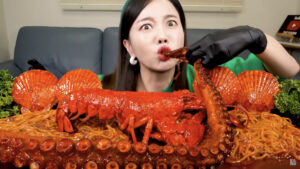Last Saturday, the YouTube personality Nikocado Avocado surprised his 4.27 million followers by losing more than 100kg overnight. Having gained notoriety via “mukbang” — that is, filming himself eating — his audience was amazed to find he’d gone from morbidly obese to slender from one video to the next. “I just took off the fat suit,” he tells the audience, before slurping down a huge portion of black bean noodles.
In reality, he’d been releasing pre-recorded videos for months, while undergoing this dramatic change. It was a staggering stunt. And in pulling it off, Nikocado Avocado reinvented himself overnight. No longer a fading internet personality with a grotesque USP, but a harbinger of digital culture’s crowning triumph: the end of “authenticity”.
It’s not a coincidence that contemporary hair and make-up fashions foreground excess and artificiality: heavy contouring, hair extensions, and the cat-like “Instagram face” that results from too much Botox and tweaking. It’s of a piece with a sense that “reality” itself is, at some level, not really real, and that this has something to do with the digital layer that now interpenetrates everything in the modern world.
The philosopher Nick Bostrom captured an early version of this sense when he proposed in 2003 that we might be living in a simulation. But the most influential popular version came just before, in the 1999 movie The Matrix. In one of this movie’s most iconic moments, Neo wakes up from the simulation to find himself in a dystopian nightmare. “Welcome to the real world,” says Morpheus after Neo is rescued.
For us, though, the switch between “Matrix” and “real world” is far more difficult to spot. We know the map is, as philosopher Alfred Korzybski put it, not the territory. And yet most of our digital overlay is designed to disappear into “reality” rather than, like The Matrix, disappear it. Rather than covering over real dystopia with fake normality, its power rests in precisely how transparent the digital overlay seems, and how truthfully it seems to map the contours of our lives. This has long reflected the original, utopian vision of the digital revolutionaries, with deep roots in the Enlightenment, to free the world’s information and make it organised and accessible.
Accordingly, when supposedly seamless digital products start showing their seams, the effect is to throw “transparency” as such into question. On the day Nikocado Avocado dramatically disclosed the gap between his bloated image and svelte reality, this happened for me in a second, more mundane way: Google Maps let me down for the first time ever. Though usually eerily accurate, it refused to notice multiple London road closures I could see with my own eyes, leaving my driving plans in tatters. And while this might seem trivial, the extent to which I rely on this app made it unexpectedly unsettling.
It isn’t just satnav, either, but the whole infrastructure of digital elements that renders life seamless. What if they all stopped reflecting reality? How many other apps do I trust implicitly to do so with integrity? What would happen if that all stopped?
In fact, it probably already has. Hardly a day goes by without new indications that our digital infrastructure curates as much as it reflects. Google has long been the subject of complaints about politicised massaging of search results, while there have been reports of Amazon pushing politically correct edits out to already purchased e-books, YouTube “demonetising” online commentators, and banks “debanking” politicians.
There is, of course, a range of views on whether such incidents are for the best. But in their aggregate light, someone more paranoid than I might be forgiven for wondering if Google Maps’ inexplicable inability to register the closure of much of Central London had anything to do with the fact that this was for a highly contentious protest. I doubt this, really, but the point is that the cumulative effect of countless algorithmic thumbs on the informational scale is, over time, highly paranoia-inducing.
For there’s no question that the relation between our ostensibly “transparent” layer of digital services, and the reality it both serves and shapes, has grown increasingly vexed and — at times — plainly partisan. This has implications for how much faith we’re willing to place in that layer. And Nikocado Avocado’s prescience lies in his having identified the way our loss of faith in transparency is also shaping how we present ourselves within it.
If we inherited a faith in transparency and truthfulness from the Enlightenment, the cognate individual aspiration is probably “authenticity”. That is: the belief, rooted in Protestantism but increasingly central since the Sixties cultural and digital revolution, that not only can we disclose our most intimate inner selves, but that doing so is intrinsically good.
Social media has accelerated, intensified, and monetised this aspiration into a grotesque pornography of the self: the moral framework whose strapline is transparent authenticity, even as its visual leitmotif is the aggressive artificiality of “Instagram face”. From reality TV and tell-all celebrity interviews, to “autofiction” and the influencers who garner money and fame by documenting the minutiae of their everyday lives, it has come to seem as though there is no creative genre left except self-creation in digital space.
It’s as though none of us is real until we’re indexed and scrollable, within a collectively assembled Google Maps of the soul. Meanwhile, the transparency of this map is taken as much on trust as the accuracy of Google’s real-time traffic updates. But in his skinny-reveal video, Nikocado Avocado boasted of being “two steps ahead” of his audience. And he was. For as it turns out, he wasn’t a helpless pawn of the algorithm at all, trapped in a doom-pit of self-monetisation for morbid gawpers. On the contrary, he abruptly flipped the tables on those “consuming” his spectacle, addressing them contemptuously as “ants” in an “ant farm” and declaring: “The joke’s on you.”
But, you might protest, isn’t the gap between appearance and reality a longstanding theme? It’s the central motif of Swift’s satirical verse The Lady’s Dressing Room (1732), for example. Here, Swift details the disgust and horror of a young man in love, who creeps into the dressing room of his beloved Celia while she is out. Once there, he recoils from filthy clothing, evidence of beauty’s artifice and — worst of all — an overflowing chamber-pot.
But for Swift, the poem’s frisson derives from the assumption that there exists a meaningful distinction between image and reality. Today, the shared dramatic convention is that because we can reveal everything, no such gap exists. A modern-day Celia would likely post “Get ready with me” videos on TikTok from her dressing room.
And even this illusion of transparency is, as Nikocado Avocado understands, itself highly artificial. “Celia” might put her make-up on while talking to the camera; but scenes of disorder in her dressing-room would be artfully curated to grant the viewer an impression that nothing is out of bounds. Perhaps it isn’t even her dressing-room, but a studio. Perhaps Nikocado didn’t really eat the black bean noodles. Is his parrot’s name even actually Mr Noodle?
In other words, the real joke was on us. But it wasn’t in what Nikocado Avocado said or did: it was in what he chose to hide. And this points to a new knowingness among the net-native, accustomed to the digital hall of mirrors. That is, that staying “two steps ahead” means being deliberate about what you keep to yourself.
With its ambivalent situation between politics, celebrity, and ceremony, the British Royal Family has already shown itself aware of this dynamic. King Charles led the way, by refusing to televise the most sacred part of his coronation. And while Diana, Princess of Wales served as an object lesson in how not to do transparency, Catherine, the current one, seems far more deft at squaring this difficult circle.
Princess Catherine has, for example, kept the minutiae of her cancer treatment stubbornly private — but also recently announced the end of chemotherapy with an “intimate” video of her enjoying family life in the countryside. And yet while composed of footage that looks warm, spontaneous and intimate, the film employs a formal, scripted voiceover and stylised cutting that foregrounds its artificiality every bit as much as an “Instagram face”. The message is, very clearly: I am willing to disclose myself, but only on my terms only.
And this isn’t just about celebrities and influencers. More Britons now get their news from the internet than television — with social media playing a huge role. In other words, we have crossed the line to become a truly digital-first culture; and this means the older, seemingly more trustworthy public conversation isn’t coming back. Nor are its associated values, such as objectivity, civility, and freedom of speech. In this context it is now only people who came of age before the social media revolution, and the group politely known as “low-information voters”, who still cling to the belief that you can and should be free to say whatever you like on the internet. Others observe the rising tide of punitive measures against politically deprecated views, under conveniently expansive categories such as “hate” and “misinformation”, and school their online personae accordingly.
As we slide further into this slippery new digital normal, we can expect trust in the transparency of the digital layer to go on falling even as our reliance upon it rises. And if there’s any future for “authenticity”, I suspect it will have nothing to do with disclosure. Rather, it will come to denote the paradoxical dance of showing, hiding and fakery employed by figures such as the Princess of Wales, or Nikocado Avocado. And to the extent that any of us can have a “true self” in this context, they will be true in inverse proportion to how searchable they are.
Disclaimer
Some of the posts we share are controversial and we do not necessarily agree with them in the whole extend. Sometimes we agree with the content or part of it but we do not agree with the narration or language. Nevertheless we find them somehow interesting, valuable and/or informative or we share them, because we strongly believe in freedom of speech, free press and journalism. We strongly encourage you to have a critical approach to all the content, do your own research and analysis to build your own opinion.
We would be glad to have your feedback.
Source: UnHerd Read the original article here: https://unherd.com/





